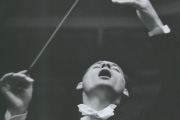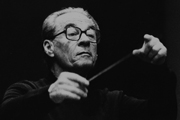biography
Witold Rowicki(26 February 1914 – 1 October 1989)
Witold Rowicki was born in Taganrog, Russia, in a Polish family. In 1923 the family repatriated from the USSR to Poland. Rowicki spent his school years in Żywiec and Nowy Sącz.
As a pupil of the 6th grade of the Pre-Secondary School in Nowy Sącz, he organised a school orchestra of over ten members. From 1931 he studied at the Conservatory by the Music Society in Kraków. He was taught violin playing by Artur Malawski and the theory of music by, among others, Bolesław Wallek-Walewski. Upon initiative of the Reverend Mieczysław Kuznowicz, the artistic youth tutor, Rowicki organised the Orchestra of the Industry and Handwork Youth Association. 1932 saw his debut as a conductor. He graduated from studies in 1938 with diplomas in violin playing and theory of music. The same year he started teaching at the Kraków Conservatory.
During the entire Hitler’s occupation Rowicki lived in Kraków, devoting his time to studies in conducting and learning composition and musicology from Zdzisław Jachmecki, with whom Rowicki was a very close friend till the end of the Professor’s life. In Kraków he married Joanna Nowak. Their first child, daughter Magdalena, was born in 1941. Two years later Rowicki lost his brother, who was executed by a firing squad at the Montelupich prison.
After the liberation Rowicki started working in a music department of the Polish Radio in Kraków, but already after one month he was asked to organise the orchestra at the Polish Radio in Katowice. On 23 March 1945 he conducted the first concert of the ensemble he created, which became acclaimed as the Great Symphonic Orchestra of the Polish Radio. From 1947 he co-operated with Grzegorz Fitelberg, who headed the Katowice orchestra after returning to Poland. In the same year his son Witold (junior) was born, who received at baptism the middle name Grzegorz after his godfather Grzegorz Fitelberg. In those years until 1950 Rowicki concerted with the Great Symphonic Orchestra of the Polish Radio both in Poland as well as in Czechoslovakia, Romania and Hungary.
In 1950 Rowicki was appointed Artistic Director of the State Philharmonic in Warsaw. Next to the opera ensemble at the Nowogrodzka Street the symphonic orchestra was established, engaging musicians from nearly all over Poland. On 12 January 1951 Rowicki conducted an inaugural concert of the new Warsaw Philharmonic Orchestra. 18 months later he entrusted Zbigniew Soja with organising the Choir Study, which later became the Mixed Choir of the Warsaw Philharmonic and the National Philharmonic. Already in May 1953 the Orchestra and Choir of the Warsaw Philharmonic, under the baton of Rowicki, performed the stage version of the Gluck’s “Orpheus and Eurydike”. In 1952-1954 Rowicki taught a class of conducting at the Higher State School of Music in Warsaw. On 21 February 1955 he conducted a concert celebrating the opening of the reconstructed Philharmonic house at the Jasna Street and conferring the name of the National Philharmonic in Warsaw to that institution.
On 21 October 1956 Rowicki conducted the works of the 20th century composers during the final concert at the 1st “Warsaw Autumn” Contemporary Music Festival. He was involved with the festival till the end of his life.
Over many years of co-operation with the Warsaw Philharmonic ensemble Rowicki organised cycles of concerts, introducing works by contemporary composers on the Polish stages. He conducted such works both during the “Warsaw Autumn” and as part of regular repertoire in all artistic seasons. He was the most loved conductor and accompanist by the young pianists during the International Chopin Piano Competitions, winning also the gratitude of the greatest virtuoso performers, such as Światosław Richter, Mścisław Rostropowicz, David Oistraikh, Wanda Wiłkomirska, Witold Małcużyński, Artur Rubinstein, Martha Argerich, Piotr Paleczny, Konstanty Andrzej Kulka, Stefania Wojtowicz, as well as the composers, such as Igor Stravinsky, Bolesław Szabelski, Dmitri Shostakovich, Witold Lutosławski, Tadeusz Baird, Wojciech Kilar, Grażyna Bacewicz, Kazimierz Serocki and Krzysztof Penderecki. Rowicki interpreted their works with insight and mastery, and many times conducted their premiere performances. During the Orchestra’s concerts abroad he presented the magnificence of the Polish music to the world. He introduced the Warsaw Philharmonic ensemble to the greatest concert halls in the world, from New York and Los Angeles through London and Paris to Tokyo and Sydney. He became indisputable authority as regards interpretations of the works by Karol Szymanowski, and “Mazury” from Moniuszko’s operas, usually left to perform as an encore, roused the audience all over the world.
Although, like not many other directors of symphonic orchestras, Rowicki spent a lot of time with his own ensemble, he also performed with the largest international orchestras, such as (among others): Orchestre de la Suisse Romande, Orchestre de Paris, Royal Philharmonic Orchestra, London Symphony, Münchner Philharmoniker, Orchestra del Teatro alla Scala, Philadelphia Orchestra. As the only Polish conductor he was included in a book published in 1965 in West Berlin and devoted to the greatest bandmasters of the century, titled “Dirigenten – Bild und Schrift”, next to Otto Klemperer, Leonard Bernstein, Ernest Ansermet, Herbert von Karajan and Eugene Ormandy.
During his long career as a conductor Rowicki recorded nearly 100 various compositions. He gave in Warsaw hundreds of concerts with the Warsaw Philharmonic Symphonic Orchestra, he also performed with his ensemble in other Polish towns and travelled with concert tours abroad. Their repertoire included all genres of symphonic music, from Bach to Xenakis.
In the middle 1960s Rowicki was for a short time an artistic director of the Warsaw Opera. He did not stop his artistic activity after retiring in 1977. He performed both in Poland and abroad. Over three years he co-operated with the Bamberg Symphonic Orchestra (Germany) and later had a very friendly relationship with that ensemble.
The great conductor had a great sense of humour, loved his family, went in for mountaineering and skiing, liked driving fast, with eagerness and competence recorded international travels of the Philharmonic on 8mm file tape, was passionate for filming nature. He allowed orchestra members to play “out of their hearts” because as one of them he trusted them totally. He always looked with affection on accompanied soloists, subordinating himself and the orchestra to them. He was the music partner of the great creators. His death closed an important period in the history of the Polish music.
Orders, medals, decorations, honour titles
Orders
| Officer’s Cross of the Order of Polonia Restituta | 4 Nov. 1947 |
| Order of the Banner of Labour, 2nd class | 15 Jun. 1950 |
| Commander’s Cross of the Order of Polonia Restituta | 22 Jul. 1954 |
| Order of the Banner of Labour, 1st class | 22 Jul. 1959 |
| Commander’s Cross with Star of the Order of Polonia Restituta | 22 Jul. 1974 |
| Order of the Banner of Labour, 1st class (second time) | 14 Sep. 1977 |
Medals and decorations
| 10 Years of People’s Poland Commemorative Medal | 17 Jan. 1955 |
| Gold Honour Decoration “Meritorious for the Capital City of Warsaw” | 10 Jan. 1967 |
| Meritorious Culture Activist | 22 Jul. 1972 |
| 30 Years of People’s Poland Commemorative Medal | 22 Jul. 1974 |
| Gold Decoration of the Association of Polish Musicians | 22 Jul. 1975 |
Other
| National Artistic Prize Decoration, 2nd grade (collective) | 20 Jul. 1950 |
| Award of the Association of Polish Composers | 17 Jan. 1963 |
| Award of the Minister of Culture and Arts, 2nd grade | 22 Jul. 1963 |
| National Prize Decoration, 1st grade | 22 Jul. 1966 |
| Award of the Minister of Culture and Arts, 1st grade | 22 Jul. 1973 |
| Award of the Chairman of Radio and Television Committee for works and artistic activity | 22 May 1983 |
| Award of the Minister of Culture and Arts, 1st degree (second time) | 22 Jul. 1983 |
Biographical note has been prepared using, among others, the materials included in the following book:
Marian Gołębiowski
”Witold Rowicki w Filharmonii Warszawskiej i Narodowej”
(Witold Rowicki at the Warsaw and National Philharmonic)
Warsaw 1991, published in Polish by the Rowicki family


